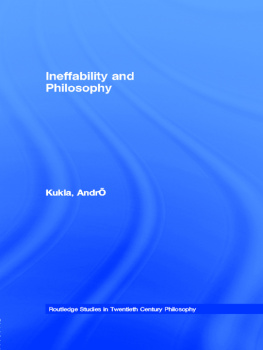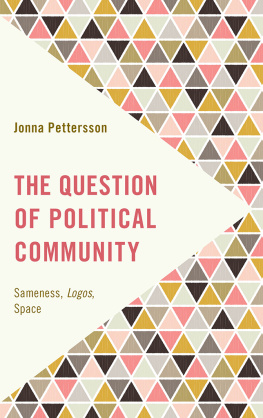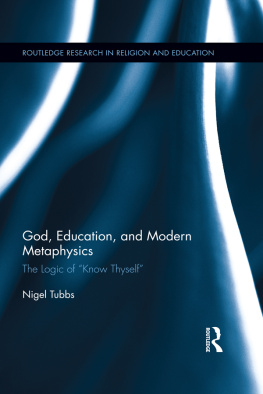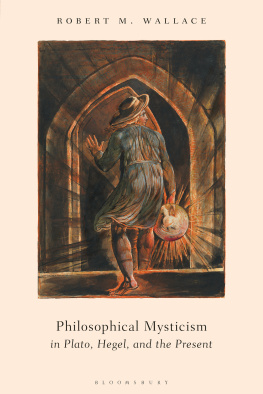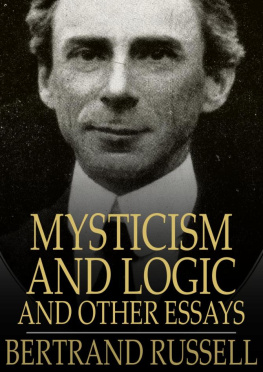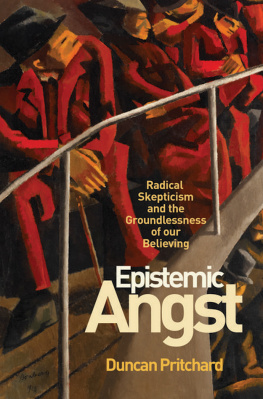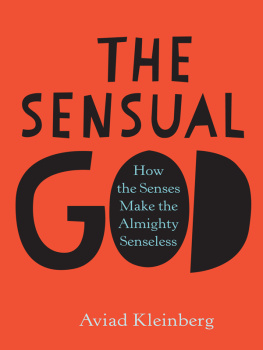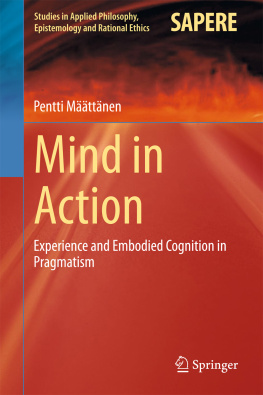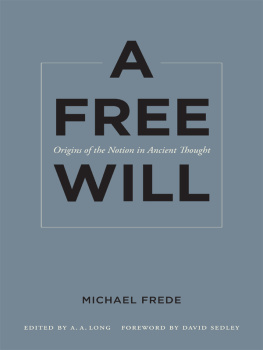Kukla - Ineffability and Philosophy
Here you can read online Kukla - Ineffability and Philosophy full text of the book (entire story) in english for free. Download pdf and epub, get meaning, cover and reviews about this ebook. City: London;New York, year: 2005, publisher: Routledge, genre: Romance novel. Description of the work, (preface) as well as reviews are available. Best literature library LitArk.com created for fans of good reading and offers a wide selection of genres:
Romance novel
Science fiction
Adventure
Detective
Science
History
Home and family
Prose
Art
Politics
Computer
Non-fiction
Religion
Business
Children
Humor
Choose a favorite category and find really read worthwhile books. Enjoy immersion in the world of imagination, feel the emotions of the characters or learn something new for yourself, make an fascinating discovery.
- Book:Ineffability and Philosophy
- Author:
- Publisher:Routledge
- Genre:
- Year:2005
- City:London;New York
- Rating:4 / 5
- Favourites:Add to favourites
- Your mark:
- 80
- 1
- 2
- 3
- 4
- 5
Ineffability and Philosophy: summary, description and annotation
We offer to read an annotation, description, summary or preface (depends on what the author of the book "Ineffability and Philosophy" wrote himself). If you haven't found the necessary information about the book — write in the comments, we will try to find it.
Kukla: author's other books
Who wrote Ineffability and Philosophy? Find out the surname, the name of the author of the book and a list of all author's works by series.
Ineffability and Philosophy — read online for free the complete book (whole text) full work
Below is the text of the book, divided by pages. System saving the place of the last page read, allows you to conveniently read the book "Ineffability and Philosophy" online for free, without having to search again every time where you left off. Put a bookmark, and you can go to the page where you finished reading at any time.
Font size:
Interval:
Bookmark:

Are there truths or facts or states of affairs in the world that cannot be expressed or represented by linguistic means? The issue arises in a number of disparate fields of speculative thought, including religious studies, the philosophy of mathematics, and contemporary cognitive science. Religion is of course the most familiar source of ineffability claims. The idea that there is an ineffable being, or truth, or experience, and that this ineffability profoundly matters to our assessment of the human condition, is one of the meanings (the non-pejorative one) of the much-abused term mysticism. There have been articulate and widely influential mystics in virtually every religious tradition. In contrast, mathematical ineffabilism is a distinctly heterodox point of view concerning some relatively arcane foundational issues in set theory and metamathematics. The mathematical ineffabilists include Cantor, Bolzano, Dedekind, and more recently, A. W. Moore (1990) and Rudy Rucker (1982). Despite their very different social situations, there are substantive similarities between religious and mathematical ineffabilisms. Both of them involve the claim that we are able to understand or come to know certain truths which it is beyond the power of language to express. As will be seen immediately below, this is not an invariable basis for ineffability claims. Mathematical and many religious ineffabilists also agree on the more specific proposition that the attempt to express the ineffable must systematically embroil us in contradictory assertions. Moore and Rucker are wont to emphasize these and other parallels by referring to their doctrine too as a species of mysticism.
There is also an influential line of thinking in contemporary cognitive science which has consequences for the ineffability thesis, although these consequences have not yet been fully spelled out. Fodor (1983), Chomsky (1975), and McGinn (1989) have argued, each in his own way, that there are bound to be some hypotheses that the human mind is incapable of entertaining. In Fodors terminology, human minds are epistemically bounded. If the argument for epistemic boundedness is sound, it seems at least prima facie plausible that it will also sustain the closely related thesis that there are facts which cannot be expressed in any humanly accessible language.
The foregoing discussion serves to locate the topic of ineffability in a broader geography of ideas. However, I will postpone the evaluation of the religious, mathematical, and cognitive-scientific arguments until , I seek to clarify the import of the ineffability thesis itself. I hold in abeyance the question of whether there are good reasons for believing in the existence of ineffable facts, and ask the logically prior question: what does it mean to say that there are facts that cannot be expressed? Are there ways to construe the ineffability thesis which are at once philosophically interesting and coherent?
Lets begin with the most familiar version of the ineffability thesis: that God, or the Tao, or the soul, or mystical experience, or some other religious object is indescribable. Here are representative claims from Asian, ancient European, and modern mystical sources:
Brahman has neither name nor form, transcends merit and demerit, is beyond time, space, and the objects of sense-experience. Supreme, beyond the power of speech to express.
(Shankara, quoted in Alston, 1972, 76)
No form belongs to Him, not even one for the Intellect. What meaning can there be any longer in saying: This and this property belongs to Him?
(Plotinus, quoted in Alston, 1972, 76)
To say that God is ineffable is to say that no concepts apply to Him, and that He is without qualities. And this implies that any statement of the form God is x is false.
(Stace, 1952, 33)
Thus to the intellect He is blank, void, nothing. You cannot attach any predicate to Him.
(Stace, 1952, 42)
The classicaland nearly definitiveanalysis of this claim is William Alstons (1972). Alstons discussion is directed to the assertion that you cannot attach any predicate to God (except, of course, for His masculine gender). Alston doesnt inquire into what it might mean for a predicate to be inapplicable to an entity. There are two candidates: the predication may be false, or it may be neither true nor false. Stace evidently interprets the inapplicability of all predicates to God in the first manner (any statement of the form God is x is false.) This interpretation of the ineffability thesis suffers from the disadvantage of conflicting with the law of the excluded middle (since God is x and God is not- x are both going to be false). But this is not an argument that Alston deploys. His arguments make use only of the principle that for all predicates x , God is x is not true . This principle is a consequence of both the view that all predications are false when applied to God and the view that all predications are neither true nor false when applied to God. Thus Alstons arguments do not require us to choose between the two interpretations of ineffability. The availability of the two interpretations will come up again in my discussion, however.
Now there are two rather different circumstances that might impel one to claim that no predicates attach to God. One possibility is that we cant attach any predicates to God because His properties are all so extraordinary that they cannot be formulated. The second possibility is that we cant attach any predicates to God because He has no properties . Only in the first case does it follow that there are facts which cannot be expressed by linguistic means (the inexpressible facts being that God possesses the attributes which we are unable to formulate). If, as in the second case, God has no properties, then the fact that nothing can be predicated of Him doesnt entail that there are any facts which we are unable to express. On this second account, we might say nothing about God and still manage to express every fact, for there is nothing to be said about Him. It would be quite a challenge to tell a coherent story about entities that are devoid of any and all properties. I bring up this second gloss on indescribable entities only because many passages in the mystical literature suggest it. The second quotation from Stace, which says that God is nothing to the intellect , is pretty clearly a claim of the first typethe implication is that the intellect is blind to what is patently there. But the first passage from Stace stipulates that we can form no concept of God and that God has no qualities , which seems to point to the second claim: we can form no concept of God because God has no qualities which might serve as candidates for representation. The same idea is also at least faintly suggested by Shankaras assertion that Brahman has no form as well as no name, and by Plotinus implicit distinction between Gods having no form even for the Intellect and His having no form tout court . My inclination is to use ineffability to refer to the thesis that there are facts that defy expression. Thus I want to say that the second gloss, according to which nothing can be said of God because He has no properties to represent, doesnt have anything to do with ineffability. This is merely a nomenclatural point. In any event, Alstons critique of the concept of indescribable entities applies equally to both renderings.
Alston presents two arguments against indescribable entities. The more complex and less effective argument is that we cant be said to understand the term referring to the supposedly indescribable entity (say, God) unless we have some way of identifying it. But any means of identification automatically provides us with a true description:
Font size:
Interval:
Bookmark:
Similar books «Ineffability and Philosophy»
Look at similar books to Ineffability and Philosophy. We have selected literature similar in name and meaning in the hope of providing readers with more options to find new, interesting, not yet read works.
Discussion, reviews of the book Ineffability and Philosophy and just readers' own opinions. Leave your comments, write what you think about the work, its meaning or the main characters. Specify what exactly you liked and what you didn't like, and why you think so.

